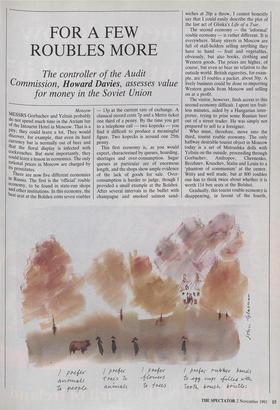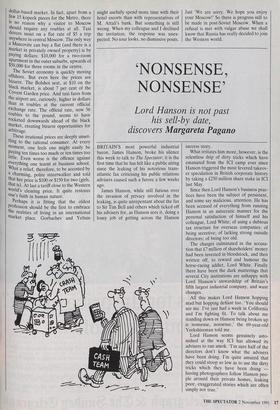FOR A FEW ROUBLES MORE
The controller of the Audit for money in the Soviet Union
Moscow MESSRS Gorbachev and Yeltsin probably do not spend much time in the Atrium bar Of the Intourist Hotel in Moscow. That is a Pity; they could learn a lot. They would discover, for example, that even its hard Currency bar is normally out of beer and that the floral display is infected with cockroaches. But most importantly, they could learn a lesson in economics. The only rational prices in Moscow are charged by its prostitutes. There are now five different economies in Russia. The first is the 'official' rouble economy, to be found in state-run shops and other institutions. In this economy, the best seat at the Bolshoi costs seven roubles — 13p at the current rate of exchange. A classical record costs 7p and a Metro ticket one third of a penny. By the time you get to a telephone call — two kopecks — you find it difficult to produce a meaningful figure. Two kopecks is around one 25th penny. This first economy is, as you would expect, characterised by queues, hoarding, shortages and over-consumption. Sugar queues in particular are of enormous length, and the shops show ample evidence of the lack of goods for sale. Over- consumption is harder to judge, though I provided a small example at the Bolshoi. After several intervals in the buffet with champagne and smoked salmon sand- wiches at 20p a throw, I cannot honestly say that I could easily describe the plot of the last act of Glinka's Life of a Tsar.
The second economy — the 'informal' rouble economy — is rather different. It is everywhere. Many streets in Moscow are full of stall-holders selling anything they have to hand — fruit and vegetables, obviously, but also books, clothing and Western goods. The prices are higher, of course, but even so bear no relation to the outside world. British cigarettes, for exam- ple, are 15 roubles a packet, about 30p. A lively business could be done re-importing Western goods from Moscow and selling on at a profit.
The visitor, however, finds access to this second economy difficult. I. spent ten fruit- less minutes, aided by a Hungarian inter- preter, trying to prise some Russian beer Out of a street trader. He was simply not prepared to sell to a foreigner.
Who must, therefore, move into the third, tourist rouble economy. The only halfway desirable tourist object in Moscow today is a set of Matrushka dolls with Yeltsin on the outside, proceeding through Gorbachev, Andropov, Chernenko, Brezhnev, Kruschev, Stalin and Lenin to a 'phantom of communism' at the centre. Witty and well made, but at 800 roubles one has to think twice about whether it is worth 114 box seats at the Bolshoi.
Gradually, this tourist rouble economy is disappearing, in favour of the fourth, dollar-based market. In fact, apart from a few 15 kopeck pieces for the Metro, there is no reason why a visitor to Moscow should require any roubles at all. Taxi drivers insist on a flat rate of $5 a trip anywhere in central Moscow. The only way a Muscovite can buy a flat (and there is a ,market in privately owned property) is by Paying dollars: $10,000 for a two-room apartment in the outer suburbs, upwards of $50,000 for three rooms in the centre.
The Soviet economy is quickly moving offshore. But even here the prices are bizarre. The Bolshoi seat, at $10 on the black market, is about 7 per cent of the Covent Garden price. And taxi fares from the airport are, curiously, higher in dollars than in roubles at the current official exchange rate. The official rate, now 56 roubles to the pound, seems to have rocketed downwards ahead of the black market, creating bizarre opportunities for arbitrage. These irrational prices are deeply unset- tling to the rational consumer. At every moment, one feels one might easily be Paying ten times too much or ten times too little. Even worse is the offence against everything one learnt at business school. What a relief, therefore, to be accosted by a charming, polite streetwalker and told that her price is $100 or $150 for two (girls, that is). At last a tariff close to the Western World's clearing price. It quite restores one's faith in human nature.
Perhaps it is fitting that the oldest profession should be the first to embrace the realities of living in an international market place. Gorbachev and Yeltsin might usefully spend more time with their hotel escorts than with representatives of M. Attali's bank. But something is still wrong. When my colleague and I declined the invitation, the response was unex- pected. No sour looks, no dismissive pouts. Just 'We are sorry. We hope you enjoy your Moscow!' So there is progress still to be made in post-Soviet Moscow. When a refusal is met with vulgar abuse we shall know that Russia has really decided to join the Western world.



































































 Previous page
Previous page